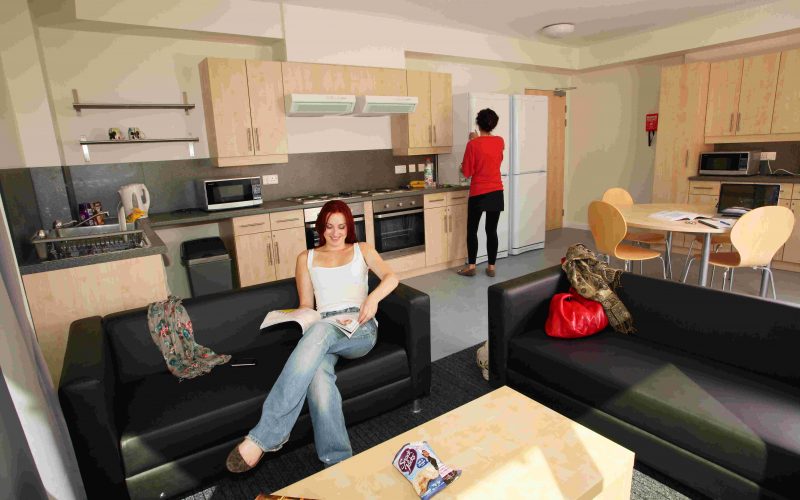So many people wonder if a non-student can live in student housing in the UK. The answer might surprise you.
In the United Kingdom, where the demand for student housing has been steadily on the rise, discussions are buzzing about the potential for non-students to find a home in these lively communities.
National Union of Students reveals that the demand for student housing has been steadily rising, and this has led to discussions about the accessibility of such accommodations for non-students as well.
The sponsor or dorm management decides whether or not non-students are permitted to live in the residence halls, regardless of the type of administration in place.
Come along as we work reveal the opportunities that exist in the UK non-student housing sector.
Table of contents
- What is Student Housing?
- Is it Legal for Non-Students to Live in Student Housing?
- Are Non-Students Allowed to Live with Students?
- Can Couples Where One Is a Student and the Other Is Not Live in Student Housing?
- Are There Any Limitations for Non-Students in Student Housing?
- How Do Housing Providers Verify Student Status?
- Are There Any Alternatives for Non-Students?
- How Can Non-Students Find Suitable Housing?
- What Should Non-Students Consider Before Opting for Student Housing?
- FAQs
- Conclusion
- References
- Recommendations
What is Student Housing?
Student housing emerges as a distinct niche within the accommodation landscape. Commonly referred to as dormitories or halls of residence, student housing primarily serves the needs of university and college students seeking convenient lodgings during their academic journey. These purpose-built spaces are designed to foster a dynamic and engaging community among students.
Characterized by its vibrant atmosphere, student housing offers not only a roof over one’s head but also a unique platform for cultural exchange and personal growth. In contrast to solitary living, student housing thrives on the concept of shared spaces and communal living. This not only promotes a sense of camaraderie among residents but also encourages collaborative learning and intercultural connections.
Student housing configurations may vary, ranging from single-room setups to shared apartments. The layout encourages interaction, with common areas such as kitchens, lounges, and study rooms strategically positioned to facilitate encounters between residents.
Managed by housing providers, these accommodations often come furnished, alleviating the hassle of furnishing for students.
Furthermore, these accommodations serve as a vital bridge. They provide a supportive environment for young individuals moving into the independence of university life. Proximity to campus facilities is a hallmark of student housing, allowing residents to seamlessly access academic buildings, libraries, and extracurricular activities.
See also: Top Tips on How To Find The Right Student Accommodation in the UK
Is it Legal for Non-Students to Live in Student Housing?
When it comes to the legality of non-students residing in student housing, the situation rests on a foundation of flexibility and institutional policies. While some might assume that student housing is exclusively reserved for students, the reality is more accommodating. Generally, there are no outright legal barriers preventing non-students from choosing this housing option.
Housing providers, driven by market demands, often extend their welcome to a broader audience, including young professionals, couples, and newcomers to the city. However, it’s important to note that specific policies may vary, with some accommodations focusing on students during peak demand periods.
The dynamic nature of student housing allows housing providers to cater to diverse needs and circumstances. The primary objective remains to create a vibrant and inclusive community, where both students and non-students can coexist. This can foster cross-generational interactions and enrich the overall living experience.
While the law itself does not impose strict restrictions, non-students interested in student housing should take time to research and understand the policies of individual housing providers. Transparency in communication is key, as this can clarify whether non-students are eligible and whether there are any limitations.
See also: What is a Sorority House? Everything To Know About Sorority Housing
Are Non-Students Allowed to Live with Students?
In the realm of student housing, the embrace of diversity extends to accommodation arrangements. Shared living spaces, where non-students and students cohabitate, have become a hallmark of modern housing offerings.
Within student housing communities, it’s quite common to find mixed occupancy setups. These arrangements entail non-students and students residing in the same vicinity. This intermingling can foster a rich cultural exchange, encouraging residents to engage with peers from various walks of life.
However, these mixed living situations enable a synthesis of experiences and perspectives. By intertwining academic pursuits with professional growth, such environments can catalyze personal development for both students and non-students alike.
Furthermore, interactions within these living quarters can lead to the exchange of knowledge, insights, and life stories. This collaborative environment can be particularly appealing to non-students seeking not only affordable housing but also a sense of belonging in a new city.
In the pursuit of a supportive community, housing providers often curate shared spaces and communal activities. These settings facilitate interactions, ensuring that the blend of non-students and students translates into a harmonious living experience.
In essence, the fabric of modern student housing is woven with threads of inclusivity. Breaking free from conventional boundaries, it welcomes a diverse cohort, where the narrative of shared living is not confined by educational pursuits but rather amplified by the collective tapestry of aspirations.
See also: 15 Sweet Scent Ways to Make Your Dorm Room Smell Amazing
Can Couples Where One Is a Student and the Other Is Not Live in Student Housing?
Navigating the realm of student housing as a couple with differing educational statuses might raise questions, but the answer is often a positive one. Housing providers, recognizing the changing dynamics of modern relationships, tend to offer flexibility when it comes to accommodating couples.
In many student housing options, the presence of a student and a non-student in the same household is not only permitted but welcomed. This reflects the inclusive nature of these accommodations, catering to a variety of living situations.
Such arrangements benefit couples by providing an environment that balances academic and professional pursuits. Couples in these settings can find a supportive atmosphere, where a student can focus on their studies while their partner can engage in their career.
Moving into student housing as a couple brings an opportunity for shared growth. Navigating the academic journey alongside a working partner allows for a dynamic exchange of experiences and insights.
While specific policies may vary, many student housing providers have provisions that ensure couples have access to the same benefits as individual students. This inclusive approach aligns with the broader ethos of student housing—creating a community where diverse circumstances are embraced.
See also: 45 Gorgeous Dorm Room Ideas You’ll Want to Copy
Are There Any Limitations for Non-Students in Student Housing?
While non-students can find a welcoming abode in student housing, it’s important to acknowledge the presence of certain limitations that may vary across different housing providers.
One common limitation is the potential for age restrictions. Some accommodations may prioritize students of a certain age range, particularly those who are within the typical university or college age bracket.
Additionally, during peak demand periods, student housing providers might prioritize students over non-students. This practice ensures that the primary purpose of student housing—to support student living—is maintained.
Moreso, certain student housing options may have restrictions on the duration of stay for non-student residents. This can be influenced by local regulations and overall housing management policies.
Therefore, it’s essential for non-students considering student housing to research and communicate directly with housing providers. Transparency about one’s status and intentions can help clarify potential limitations and ensure a suitable living arrangement.
While limitations may exist, they often stem from the commitment to maintaining the integrity of the student-focused environment that student housing fosters. These limitations, if present, are put in place to strike a balance between accommodating non-students and preserving the primary function of these accommodations.
See also: The Best College Cities for Student Housing in the US
How Do Housing Providers Verify Student Status?
Housing providers, entrusted with maintaining the integrity of student housing communities, implement various methods to confirm the student status of prospective residents.
One of the primary verification methods involves requesting a valid student identification card. This simple yet effective measure ensures that the individual is indeed enrolled in an educational institution.
In some cases, housing providers may require official enrollment confirmation documents directly from the respective institution. This helps establish the current student status of the applicant.
Verification processes may also include cross-referencing with the institution’s database or registrar’s office. This ensures real-time accuracy of the student’s enrollment.
Communication between the applicant and the housing provider plays a crucial role in the verification process. Clear and prompt sharing of relevant documents can expedite the verification.
To foster transparency, some housing providers might request a reference letter or contact details of an academic advisor. This additional layer of verification reaffirms the student’s status.
See also: 10 Best Futons for Your College Dorm in 2024
Are There Any Alternatives for Non-Students?
For individuals seeking housing options beyond student accommodations, several alternatives cater to the diverse needs of non-students.
Private rentals, often available through real estate agencies or online platforms, provide flexibility in terms of location and living arrangements. This alternative grants individuals more control over the type of housing they desire.
Shared accommodations, where individuals rent a room within a larger dwelling, offer a communal living experience without the confines of student-specific housing. This can be an attractive option for those seeking affordability and social interactions.
Co-living spaces, a growing trend, merge the concepts of shared and private living. These spaces offer a balance between community engagement and personal space, making them appealing to non-students.
Renting apartments or flats, while more traditional, provides non-students with independence and dedicated living space. This option is often suitable for those looking for long-term housing solutions.
Homestays, where individuals rent a room in a family home, can provide a unique cultural experience alongside housing. This alternative suits those interested in an immersive living situation.
See also: Are Candles Allowed In Dorms? Best Candle Alternatives In 2024
How Can Non-Students Find Suitable Housing?
Navigating the realm of housing as a non-student demands a strategic approach to ensure the right fit for individual needs.
Online platforms, such as real estate websites and classified ads, are rich resources for finding housing. These platforms allow individuals to search for accommodations based on specific criteria, such as location and budget.
Additionally, engaging with local community groups or social media, especially those related to housing and rentals, can yield valuable leads. Actively participating in these forums can help non-students tap into insider information.
Direct communication with housing providers, both student-specific and non-student alternatives, is essential. Asking relevant questions about policies, requirements, and availability can clarify the suitability of the accommodation.
Furthermore, networking, whether through acquaintances, colleagues, or online connections, can also yield housing opportunities. Leveraging personal and professional networks can lead to hidden gems that may not be listed on traditional platforms.
Physical visits to potential housing options allow non-students to evaluate the environment, proximity to essential amenities, and overall comfort. This hands-on approach can provide a deeper understanding of what each housing option entails.
See also: Important Roommate Ground Rules to Set
What Should Non-Students Consider Before Opting for Student Housing?
Before deciding to live in student housing, non-students must weigh several key factors to ensure a harmonious living experience.
Location is a pivotal consideration. Assess the proximity of the housing to your workplace, public transportation, and other essential amenities. This ensures convenience in daily commuting and access to necessities.
Understanding the housing provider’s policies is also paramount. Investigate whether they allow non-students and if there are any limitations. This clarity helps avoid potential conflicts down the line.
The communal living environment that characterizes student housing might not suit everyone’s lifestyle. Consider whether you are comfortable sharing spaces and interacting with a diverse group of residents.
Budget plays a significant role. Evaluate the cost of living in student housing compared to other housing options. This assessment ensures that the chosen accommodation aligns with your financial capabilities.
The duration of stay is another aspect to contemplate. Clarify whether the housing arrangement suits your short-term or long-term plans.
Reviewing the amenities offered by the housing provider is essential. Assess the availability of facilities such as laundry rooms, communal spaces, and security measures. This contributes to a comfortable and secure living environment.
Consulting with current or former residents can provide valuable insights into the day-to-day living experience. Their perspectives can offer a more realistic picture of life within the student housing community.
See also: 35+ Dorm Wall Decor Ideas: Transform Your Space with Style
FAQs
You have a right to rent if: You have current immigration permission to be in the UK, for example, a Student visa (including a Tier 4 visa) or a Short-Term Student visa; or. You are an EEA/Swiss national or family member of an EEA/Swiss national with status granted under the EU Settlement Scheme
Halls often have their own sports teams and events so they’re great for your social life. However, you don’t get to choose who you live with. Whilst universities try to pair people based on their preferences, you may be in a situation where you don’t like your flatmates.
It depends on the accommodation type but there are plenty of options for shared student accommodation. If you live in uni accommodation or private halls, both residents will need to be students. However, it’s important to consider the challenges you might encounter while sharing space with another person.
The tenancy agreements for university halls usually align with the academic calendar, spanning the length of the academic year – from September to June or July. For university halls, the length of stay is typically a fixed-term contract.
One or two nights is fine
Having them in your room for a night or a weekend is usually okay. But any longer than that and problems can start. Flatmates start to feel uncomfortable and excluded in their own home. So keep overnight visitors to a two-night maximum stay.
Conclusion
While the primary target of student housing remains students, the option if non-students are allowed to live in these accommodations is feasible and offers unique advantages.
As the housing landscape continues to transform, accessibility and inclusivity might become even more pronounced, making student housing a viable choice for a broader audience.
References
- Ezilet.net – Is Student Housing Only for Students?
- Mansionstudent.co.uk – Accommodation for non-students
- Thinkstudent.co.uk – Do You Have to be a Student to Live in Student Housing in the UK?
- Studentblows.com – Can a Non-student Live in Student Housing?
Recommendations
- Top Tips on How To Find The Right Student Accommodation in the UK
- What is a Sorority House? Everything To Know About Sorority Housing
- The Best College Cities for Student Housing in the US
- 35+ Dorm Wall Decor Ideas: Transform Your Space with Style
- 15 Sweet Scent Ways to Make Your Dorm Room Smell Amazing
- 45 Gorgeous Dorm Room Ideas You’ll Want to Copy



